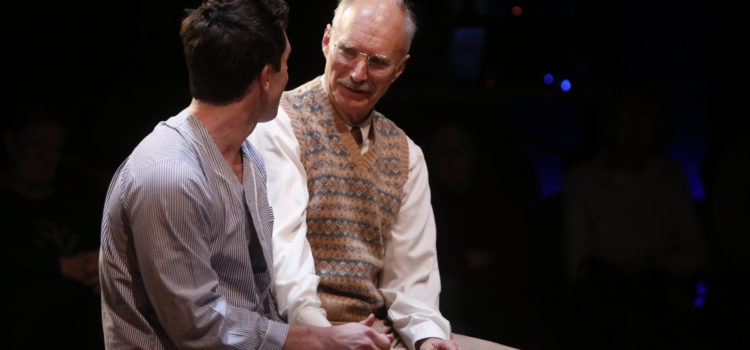By Lynn Venhaus
Managing Editor
Flour, butter and sugar can create magic if other ingredients are at play. “Waitress,” the musical equivalent of comfort food, shows us that if love, hope and inspiration are in the mix, that is a dandy can’t miss combination.
Besides inducing cravings for pie – whatever expert pie-baker Jenna Hunterson calls them (“Getting Out of the Mud Pie” is just one), this stage adaptation of writer-director-actress Adrienne Shelly’s 2007 hit independent film evokes warm feelings about family and friends.
Its charming workplace setting in a small-town Southern-fried diner is easily relatable because of a tight trio of spunky females who have made it their home away from home.
This delightful threesome – Christine Dwyer as dreamer Jenna, Ephie Aardema as geeky Dawn and Maiesha McQueen as sassy Becky, even with their thorny man-troubles, is all for one and one for all, just like those famous fictional friends.
The women shine because of their noticeable bond and harmonize beautifully in such numbers as “A Soft Place to Land” and “The Negative.”
The national tour, now playing at The Fox Theatre in St. Louis for the first time since it began in 2017, has quickly won over audiences with humor and heart – and the smell of baking pies wafting through the lobby.
The funny and uplifting show, nominated for three Tony Awards in 2016 – the year “Hamilton” was a runaway train — is still playing on Broadway, enticing audiences with its appealing female empowerment theme and catchy melodious pop songs.
Jenna is a plucky sort trapped in an unhappy marriage who dreams of breaking free if she wins a nearby county’s baking contest prize money. She suffers a few setbacks, namely a surprise pregnancy with a controlling, abusive husband. She also falls for the new doctor in town –and he’s married, but they engage in a mad affair. So, it’s complicated. She’s in this unusual pickle, and how can she find her way to a better life? She must concoct her own recipe for success.
As Jenna, Dwyer projects vulnerability and resolve, finally taking courageous steps once she gives birth (“The Contraction Ballet” – yes, they go there). Her numbers “What Baking Can Do” and the rise-up motherhood anthem “Everything Changes” are among the highlights.
The book by Jessie Nelson doesn’t skirt that Jenna’s life is a hot mess, nor do the candid songs. You gotta love a musical with a musical number “Club Knocked Up,” which is set in a doctor’s office.
The music and lyrics are by Grammy-nominated singer-songwriter Sara Bareilles (“Love Song,” “Brave,” “King of Anything”), who provides emotional soul-baring ballads, such as “She Used to be Mine,” in this medium too.
However, the peppy cast really sells the big numbers with panache – making them crisp and snappy from the start, “Opening Up” and “Bad Idea” among them.
The Ogie-centered numbers, “Never Ever Getting Rid of Me” and “I Love You Like a Table” feature Lorin Latarro’s fast-paced choreography and the scene-stealer Jeremy Morse as the odd soulmate Dawn discovers on her blind date, who she met online. He and Aardema are terrific together.
Morse’s comic timing is superb, as is Ryan G. Dunkin as laid-back but put-upon cook/manager Cal. The other sympathetic male is Richard Kline as cantankerous customer Joe, who owns the diner. In the movie, the character was played by Andy Griffith, in his last film role.
As for the husband and lover, these are one-note parts. Earl doesn’t have any redeeming quality whatsoever, and Matt DeAngelis plays him well as an insufferable jerk, but it’s a head-scratcher that Jenna has been married to him for as long as she has.
Then, Dr. Pomatter is the dreamy OB/gyn, but he’s married to a perfectly fine woman who is working her residency at the hospital. The infidelity is hard to get past. But Steven Good is fine in the role, pairing well with Dwyer in “It Only Takes a Taste” and conveying his conflicted heart in “You Matter to Me.”
DeAngelis and Good were in the Broadway cast, as was Morse.
Morse’s Ogie is such a lively goofball that he clearly steals the show. But giving him a run as audience favorite is Dawn Bless as Nurse Norma, whose impeccable comic flair is a hoot, especially when the pair-in-heat think they’re fooling her.
Another favorite moment is the arrival of young Lulu for the final scenes in the diner. In St. Louis, she is played by Penelope Garcia and Norah Morley, both 5 years old, who were selected in local competition for the cameo roles. The adorable and energetic Penelope played Jenna’s daughter on this night.
Of note would be that Jenna and Dr. Pomatter’s physical relationship in his office is more naughty than nice. Just in case you are bringing younger children. If there was a rating, it would likely be PG-13 (at least).
A nice touch is the band’s presence in the diner. The six musicians are a tight group – with Music Director Robert Cookman on keyboards, Conductor Lilli Wosk on piano, Jeff Roberts on drums, Lexi Bodick on base, Nick Anton as cello/guitar and Ed Hamilton as guitar.
“Waitress” is a small, sweet show with enough tartness and zip to make it a pleasant pop experience, all the better with girlfriends in a female-heavy crowd.
“Waitress” is at The Fox Theatre March 26 – April 7. For tickets, contact Metro-Tix or the Fox Box Office, and for more information, visit www.fabulousfox.com

Lynn (Zipfel) Venhaus has had a continuous byline in St. Louis metro region publications since 1978. She writes features and news for Belleville News-Democrat and contributes to St. Louis magazine and other publications.
She is a Rotten Tomatoes-approved film critic, currently reviews films for Webster-Kirkwood Times and KTRS Radio, covers entertainment for PopLifeSTL.com and co-hosts podcast PopLifeSTL.com…Presents.
She is a member of Critics Choice Association, where she serves on the women’s and marketing committees; Alliance of Women Film Journalists; and on the board of the St. Louis Film Critics Association. She is a founding and board member of the St. Louis Theater Circle.
She is retired from teaching journalism/media as an adjunct college instructor.



